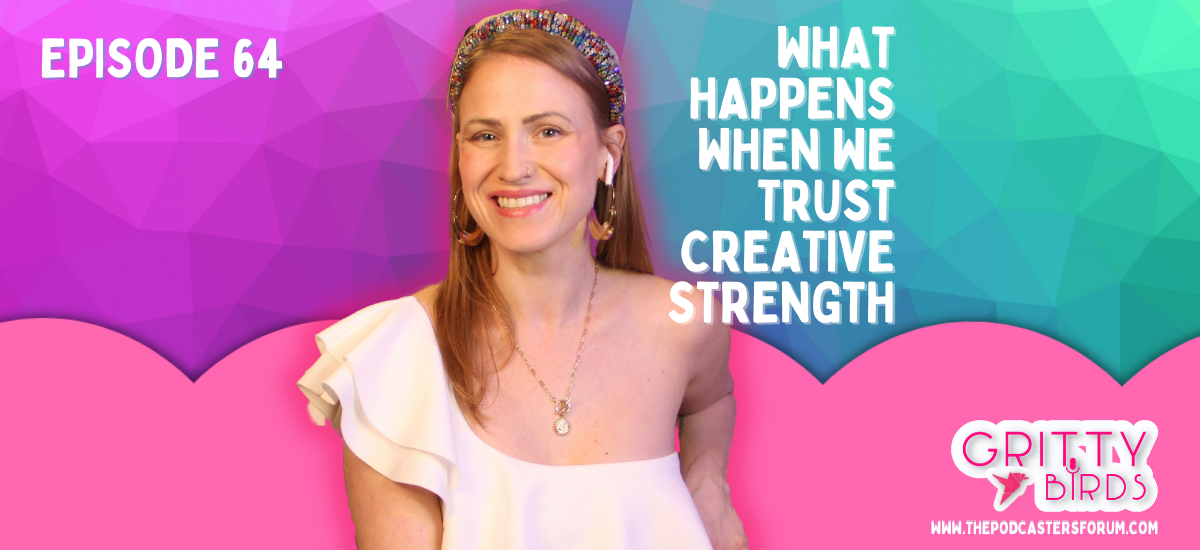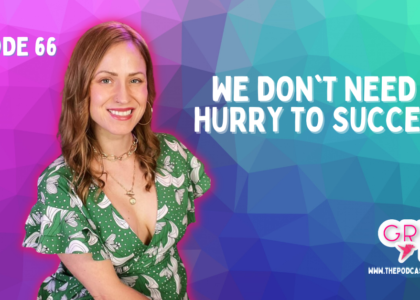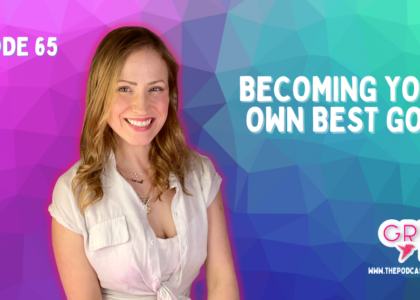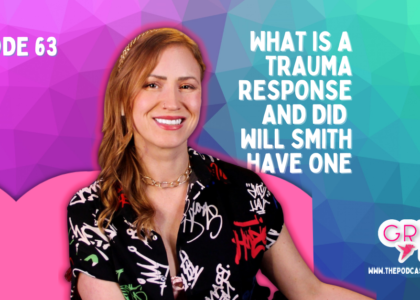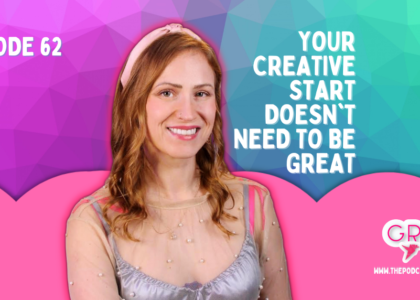Add Your Heading Text Here
This week we’re diving into our creative STRENGTH. I’ll dive into:
why we should stop focusing on our faults,
how they they aren’t faults in the first place,
and then guide you through an exercise that helped ME reframe how I viewed the world last fall.
It’s a powerful tool that will help you fortify the strengths you already have. Staying creative involves flexing a lot of different muscles, and the more we can do to keep them in mind.. the more fortifed we are as a whole!
- [00:00:00] Vocal Coaching
- [00:00:57] Intro
- [00:01:58] Writing for our friends vs our critics
- [00:03:03] Everyone puts their faults above their strengths because... capitalism
- [00:04:11] Mothers and and their 24 hours
- [00:05:20] Perceived faults aren't faults
- [00:06:11] Breaking down: I'm always late
- [00:07:48] When faults aren't faults-mothers
- [00:09:54] Green room - creating a save space for exercises
- [00:10:40] What do you like about yourself?
- [00:12:42] Affirmations as BROTH
- [00:13:43] 4 week affirmation practice
- [00:16:15] Closing
- [00:17:18] Outro
Transcript
[00:00:00] Vocal Coaching
Have you ever wondered what exactly vocal coaching is? No, it’s not just about how you sound and the way that you breathe. It’s also about how you feel when you speak and how that impacts the message you are sending out in the world. I’ve been a vocal coach for you. As a professional singer and podcaster, and I’m focused more than ever on supporting creators through voice and messaging.
It’s part of the work that I do over at my company, that podcasters forum, supporting content, creators, speakers, and entrepreneurs to create a stronger. Impact with their voices. Curious, go to the podcast, forum.com right now, and sign up for your free podcast growth checklist, and then sign up for a time to chat.
Let me help you find the confidence in your voice to fully make the bad-ass and you shine. Now let’s get going with the show
[00:00:57] Intro
energy energy. This is pretty birds. 2.0, I’m here to help you reconnect to your passion for life, change your patterns, and ultimately empower the grit you already have within you to thrive as a creator. I’m your host content, creator, media and voice coach, singer, and owner of the podcasters forum. Jeni Wren Stottrup.
Thank you all so much for your support. The first couple of weeks, please help spread the word about the show. If you love it, it really takes a village every little bit. This week, we’re diving into our strengths. I’ll get into why we should stop focusing on our faults, why they aren’t false in the first place, and then guide you through an exercise that helped me reframe how I view the world last fall.
It’s a powerful tool. That’ll help you fortify the strings. You already. Now let’s get going. This is pretty birds and it’s time to create
[00:01:58] Writing for our friends vs our critics
What would happen if we trusted in our creative strengths, instead of letting our creative faults lead us a few weeks ago, I was listening to an episode of Bernay Brown’s podcast unlocking us. And she mentioned her first name. She said, I wrote the first one for my critics, but when I started writing them for my friends, everything changed.
This quote has been on my mind ever since when we write for our critics, we’re coming from a place of defense. We’re holding back because we don’t want to look behind us. We don’t want to be vulnerable when we face other people. But when we write for our friends, we don’t hold back or unapologetically ourselves.
Our friends support us. They give us positive feedback and are open to learning from us. They encourage us to be more ourselves. What if we took this principle and applied it to our own personal and creative strengths? What if we let our strengths have a starring role in our lives? And we began writing our lives by their code.
[00:03:03] Everyone puts their faults above their strengths because… capitalism
On last week’s episode, I shared about speaking to folks at podcast movement about the thing that they. Everyone had zero issue, thinking of something from heads of companies to successful creators over and over, nobody hesitated to admit that they struggled with something in their process. Putting our creative faults at the forefront is something that everybody does in ways.
This is oddly encouraging because none of us are free from the burden of questioning and ourselves to some degree. But why is it we’re giving our doubts first billing in the play we’re writing about our lives. Let’s take a look and be honest with ourselves about where these doubts come from. It’s easy to get caught up in comparison, but I have some news for you.
It’s built into our society. It’s grown from unrealistic social standards and the expectations placed on us by capitalism. Keeping up with the Joneses still exists. It’s simply as a new set of roles between each generation. Yeah. We often forget that none of us have the same 24 hours and we don’t have the same 24 hours.
[00:04:11] Mothers and their 24 hours
Our parents did an obvious example of someone that isn’t given enough credit is mothers. There’s evidence that today we have more care-taking balanced in the household between men and women. Yet it hasn’t changed as much as we’d like to think. At the same time, women are still expected to meet the same growth metrics as men in the workplace at the same pace, advancement still means shutting off that.
Instead of the workplace making adjustments for long-term growth while they women are single parents are expected to be the perfect parents to look at it. Another way. What we inherit from former generations affects our wealth habits, where we live and our opportunities. From the schools we’re in to the jobs were offered to the cost of homes, or even if someone can get a loan based on their zip code.
This example is known as red coating and it’s, well-known, it’s been a hot topic in the city. I live in Portland, Oregon, among black communities. They create drastically different circumstances for each one of us. And I haven’t even started to get into how these are further complicated for those with disabilities, especially in diverse communities.
[00:05:20] Perceived faults aren’t faults
It can feel overwhelming. But I have some good news for you. Most of the qualities that we call faults that are creating the challenges are not even false at all. And they lead us to believe that we have creative faults and aren’t capable of expressing ourselves old laws and dated societal standards have kept them behind us hurdles.
And we’ve come to assign these as false to ourselves when they simply aren’t. They’re a shame that we didn’t fit a standard of society. And we ended up playing value in it because they did. But the fact is that fault, it was never bad or good. It is possible that it’s creating issues that you don’t have control over.
That’s frustrating, but it’s not fair to ourselves or others to jump to a judgment that it’s bad.
[00:06:11] Breaking down: I’m always late
Let’s take a look at one. The statement I’m always running late first. Let’s take away the extreme in this. If we do this, it actually becomes a positive communication strategy. I’m running late. It’s neither good, nor bad.
It just is next. Let’s think of the circumstances of when this behavior happened and ask ourselves some questions. Is there something that affects why you have a tendency to arrive after the agreed upon time? For example, are you like me and experienced time blindness as a person with ADHD? Are you a parent or somebody who has elements to their schedule that are outside of.
Were you raised in an environment where you acclimated to chaos? Do you notice this is normalized for you? Do finances or your values affect your means of transport? How close do you live to the place that you’re heading? Or what kind of access to services do you have? For example, if you’re taking public transport, because you believe in saving money and you don’t have a car, obviously that’s going to take you longer to get somewhere.
And you’re always going to have to rely on public trains. Or if you don’t have the ability to pay for a car, you’re also going to be affected by this. And if you’re a parent who, once you unpack all of that, it gives you some data to work with that you can use to make adjustments. If you need to.
The next question is whether this behavior is negatively affecting your relationships or your personal growth, can you change it without creating issues in another place in your life?
If so, Maybe we can adjust our expectations a little bit.
[00:07:48] When faults aren’t faults-mothers
For example, let’s look at our hardworking mother, her friends get together every other week. She’s the one who’s quote, unquote, always late as a friend say, and this is starting to get to her. She’s begun to say it’s one of her faults. First. She really always late.
I bet she hasn’t laid everywhere, but it may feel outsized since it’s brought up by this group of friends. Every time she comes over. Next let’s look at solutions. She could hire a babysitter for an hour longer, which is another $20 an hour solved. But that $20, it looks different depending on what her 24 hours looks like.
If she’s a single mom and financially strapped, that’s tough. She would be more likely to use that money. So she’s not late to work and it feels totally justified that she’s late to meet her friends. It’s not a. When we take on shame, we allow ourselves to quit seeing the solutions available and to accept judgment that simply isn’t due.
If our behavior is affecting others, we can ask them and inquire to find out how important it is to them. We can see where it fits in with our boundaries and values and what we can take on. And we can have a dialogue in a comfortable, positive way in this scenario, the friends might offer to help or simply understand why and let it go.
If those friends can support you based on your circumstances that they don’t relate to, and that, you know, your boundary on that’s on them and you’re off the hook.
[00:09:19] Putting value in faults leads to questioning creative strength
It’s time to stop assigning value that just shouldn’t exist. Putting value in shame keeps us from making positive changes and continues to encourage biases.
It makes us more susceptible to questioning our creative faults and ignoring the strengths that help us through isn’t this the prime example of writing for your. Now that we’ve broken down, why it’s time to reframe how we think about the areas that we have room to grow? What does it mean then to make creative strengths, the starring role, and to trust it?
[00:09:54] Green room – creating a save space for exercises
How can we start writing that place in our lives for our strengths? I used to be very active in theater and the room where we’d wait for the audience to come to us was the green room. It was here that we transitioned. Or when does people came to us? It’s a very vulnerable place, lots of excited emotions and costume makeup, and the land of feedback.
The green room was a safe space because it was supportive. It’s a room of transition, neither in the stage room or real life. It’s somewhere in between. Let’s take a moment and go into our personal green room. We’re going to do an extra.
[00:10:40] What do you like about yourself?
Ask yourself. What do I like about myself? Take a moment and just think about this
great job first. Did you think of something physical or was it a character trait next was your first thought a positive thought or a negative. Did you feel comfortable doing the exercise or did you feel resistance to it and roll your eyes? Did it make you feel comfortable thinking about your strengths or did it make you uneasy and maybe it made you giggly because it felt good saying nice things about yourself, but a little bit weird.
Was it a mix of all of the above sometime today, before you go to bed, I want you to write down two of those strings. When you do this, consider how the feelings you had around the initial exercise have changed. Last fall. I was introduced to a new form of affirmations. Affirmations are a process that I had often heard worked, but at the same point, I was very wary about them is saying something I don’t buy over and over really going to make a difference in ways my dad was spot on only because of how I was approaching.
Over time, we can influence our brains to adopt changes, but it’s not about the sheer will of the decision. It’s not about convincing yourself. I’m happy. That’s toxic positivity. Many of the exercises I’ve done over the years or develop myself are ultimately about setting up an environment to let other shifts happen.
These shifts become far more powerful because the focus on creative strengths allows. To look at everything in a different light. It allows us to see opportunities. We were missing all along. It allows us to see things that we thought were coincidence is that aren’t
[00:12:42] Affirmations as BROTH
the exercise I’m going to show you today is a lot like cooking broth water alone is good for you.
No question. But if I think to save my food scraps from the week and I heat up water and cook it all together. The water becomes fortified by the foods that I was eating already that were already making me healthy. All of the things that we’re doing great in our lives right now are the things that are adding to our strengths.
When you get up and go in the morning, when you eat a good breakfast or work out or call a friend, all of these little things that you don’t think about as important are building into the world that we’re building around stress. It’s getting bored of fight is worth throwing them into the broth along with the strengths.
Now, not only is the strength good for you, it’s United with everything else. And it becomes extremely powerful. We want to be able to prepare our minds to develop that four to five strength like the broth simmer.
[00:13:43] 4 week affirmation practiceMy friend, Adrienne Van Der Valk of river recovery introduced this process of affirmations to me, which was applied to changing habits, but it can be used to fortify strengths instead of repeating a mantra that your brain is not ready for.
We ease into it over four weeks. You will repeat these a minimum of 10, maybe 50 times every single. You can even write them down. That really helps. If you hear yourself saying something negative in your mind, while you were saying these to yourself, pretend that you’re gently telling that thought I hear you, but now I’m letting you go.
Thanks for visiting. That’s the door and returned to the work. Let’s use my example of being a great vocal coach week one, we’re setting the stage. I know I can embrace the fact I’m in great vocal. The next week, we’re saying this in a way that shows confidence and preparation. I am ready to embrace the fact that I’m a great vocal coach.
That third week we are owning it with confidence. I’m a great vocal coach and the final week we’re letting it go. Or in this case, transitioning it to a new relationship. I’m going to take action. On my scale of being a great vocal coach, you’re going to keep saying this in a prompt, in a progressive way, preparing your brain for it and allowing yourself to notice the ways that this compliments and hinders other pieces of your life.
[00:15:20] Affirmations as guide to seeing the bigger picture with easeA lot of the work and feeling better about your strengths, especially creative strengths is getting more comfortable with the. It’s in this place that you’re going to notice the areas in your life that it shines. You’re going to become more aware of opportunities that it brings with ease. You’re going to notice where you haven’t been feeding it enough.
Simply seeing your strengths allows you to see the power that you already have. And the real power becomes about the subtle changes that open you up to the magic of opportunity. It’s not convincing yourself of something by road statements. For every one of us, it’s going to look just a little bit different.
We’re becoming more observant of how it fits into our lives. And that’s so powerful.
[00:16:15] Closing
This is where we start to make creative strengths, a starring role in our life and trusting in our strengths, not allowing the areas where we have weaknesses or that we’re working on our faults to have as much power over it.
Everybody has their thing. And while there is value in knowing what those things are, to be able to follow through and walk through them, a lot of strength exists in being able to see the beauty in the entire page. It’s being able to observe the good in the world, because I know that it’s hard out there right now.
It really can be challenging to stay in a good mood and embrace everything. That’s amazing. There are difficult things happening in the world, and I’m not talking about ignoring issues to say, everything’s great. Everything’s perfect. Instead, it’s reminding yourself of the good and letting our. Hold the flashlight and it’s that, which makes us a better leader every single time.
And it will change everything.
[00:17:18] Outro
Thank you for being here and watching, please share with your friends, make a comment below, send me a message. And I want to know what your affirmation is that you’re going to work on this month. I’d love to see and hear how it goes. Go ahead and follow me on your favorite pod player and here on YouTube, of course, that’s youtube.com/gritty birds.
Version on Fridays and the original podcast and Wednesdays, you can go ahead and actually check on my tick-tock. I’ve got reels, a bunch of really fun things. I love doing short videos, and I’ll be speaking on that at pod Fest. I’m here to lift you up and remind you that you are strong. You can follow the podcast on Instagram, Tik, TOK, and Facebook at gritty birds, media, and gritty birds on Twitter.
And I’d love to help you become a better speaker. You can work with me and get a lot more resources over at the podcast. I have more creator based resources on my channels at the podcasters farm on Facebook and Instagram. You can check that out. Thanks again. And I’ll see you guys next week. Bye .

